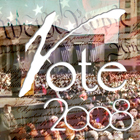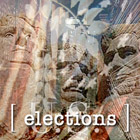
|
IOWA CAUCUSES COMPLICATE, ELUCIDATE MEASURE OF VOTER SUPPORT UNIQUE SYSTEM BRINGS MUCH DIRECT CANDIDATE-VOTER INTERACTION, DESPITE INDIRECT MEASURE OF VOTER PREFERENCE 3 January 2008 Often treated by mass media reporting as an "idiosyncratic" or "archaic" process, the Iowa caucuses are voters' first opportunity to weigh the value of the spectrum of candidates running for the office of the presidency. A caucus is not a vote, as such, but rather a discussion that ends with voters standing in the corner —quite literally— of the candidate they support. The direct result of this process being privileged by coming first among all primary processes is that candidates must mingle with and meet and listen to individual voters across a sparsely populated state. While Iowa is not considered to be sociologically or demographically representative of the majority of the country, this one-to-one contact brings the candidates' rhetoric down to Earth and forces them to keep in touch with the needs and struggles of average citizens. The Republican process differs from the Democratic process in that in August of the preceding year, the Republican Iowa Straw Poll measures caucus support for potential candidates, and the winner is often the winner in the election-year caucus contest. This year sees a possible inversion of that trend, where August 2007 Straw Poll winner Mitt Romney now trails Mike Huckabee 31% to 25% in rolling polls of "likely caucus goers" on the eve of the caucus. The actual delegate selection process for Republicans is not very direct, as the precinct caucuses themselves result in non-binding voter "recommendations" to precinct delegates, who then select county delegates, who then select district delegates, who then officially select the statewide delegates that will cast their vote for a candidate at the Republican National Convention. The Democrats have a more complex process, but perhaps a more direct way of naming the candidate as per voter intent. Delegates are assigned proportionally, according to support won by each candidate in each precinct. But there is a complicated process, specific to each caucus site, wherein the "viability" of each candidate (having a minimum of 15% support, for example), is determined, and only candidates meeting that criterion can win any delegates at that site. "Participants indicate their support for a particular candidate by standing in a designated area of the caucus site (forming a 'preference group'). An area may also be designated for undecided participants. Then, for roughly 30 minutes, participants try to convince their neighbors to support their candidates. Each preference group might informally deputize a few members to recruit supporters from the other groups and, in particular, from among those undecided. Undecided participants might visit each preference group to ask its members about their candidate", according to Wikipedia. Once viability is determined, there is a "realignment" of voter support, and the "preference groups" or "caucuses" are adjusted before a final head count, which determines the level of support for each candidate at each caucus site. Delegates are initially selected at the precinct level, the individual caucus sites, and those delegates are bound to the candidate they were assigned to support by other precinct members, but may later realign in a caucus process similar to the initial precinct caucus. While both parties' processes allow for a potential overall realignment of delegate support, and therefore a reversal of fortunes for the candidates before the actual national conventions, such reversals are rare, so media tend to report that the caucus-night leader is actually the final winner of the Iowa caucusing process. [s]
BACKGROUND: The Electoral College is a procedural peculiarity enshrined in the Constitution, initially intended to protect the voting power of slave-holding states, which puts the very concept of majority rule in question. A California plan to "reform" the system would grant electoral college votes to the Republican party even if it doesn't win the state, which would rob the Democrats of votes they would not gain in any state controlled by Republicans. [Full Story] DEMOCRATS WIN HOUSE OF REPRESENTATIVES, REPUBLICANS SUFFER HEAVY LOSSES AT POLLS Among the early news emerging from the 2006 midterm elections: Hillary Clinton, Ted Kennedy win by wide margins; embattled Republican senator Rick Santorum is ousted by Bob Casey, Jr., by margin of nearly 59% to 41%; Rep. Weldon loses seat in PA, largely due to corruption scandal; Democrats take control of House of Representatives. [Full Story] SECURITY OF U.S. ELECTIONS, VOTING RIGHTS NOT GUARANTEED The 2000 election process gave clear evidence that the established system for running elections and counting votes in the United States is not cohesive, not fool-proof and not secure against tampering. Congress took action to reform voting standards nationwide to "Help America Vote". But that legislation suffered one fatal flaw: while promoting the shift to touchscreen ballots, it did not require that electronic balloting machines produce a paper record that could be hand-checked. [Full Story] TWENTY-SIX STATES HAVE PASSED LEGISLATION REQUIRING PAPER TRAILS FOR ELECTRONIC BALLOTS Since the 2000 election, voting technology has become a major issue in US elections regimens and regulations; touchscreen balloting machines, which legislatures seem to have favored as a way to record votes accurately, eliminating the 'hanging chad' problem, were designed with no paper record and have proven insecure and susceptible to tampering. Now, 26 US states have passed laws requiring paper trails, and 13 more, plus Washington, DC, have proposed laws "not yet enacted". [Full Story] SAN DIEGO COUNTY SENT VOTING MACHINES HOME WITH POLL WORKERS ON EVE OF ELECTION Reports have emerged that according to the San Diego registrar of voters, poll workers in San Diego county took tamper-susceptible Diebold voting machines home on the eve of the election. In some cases, poll workers may have had unsupervised access to the machines for a week or longer. [Full Story] TEXAS REDISTRICTING FOUND ILLEGAL BY JUSTICE LAWYERS, FINDINGS OVERRULED New documents show Justice Department lawyers unanimously found the Texas Congressional redistricting plan to be illegal. But that finding was overruled by top Justice officials and the staff involved in the research and analysis "were subjected to an unusual gag rule", this according to the Washington Post. [Full Story] |
||||||
|
|||||||









